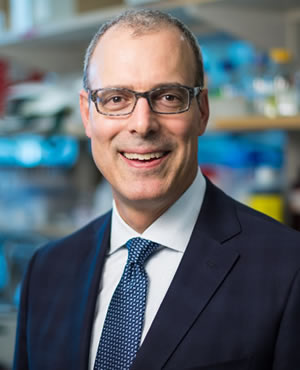Discovery to the Mountaintop

What researchers learn on the climb may matter the most
If you think of cancer as a mountain and getting to the top as the cure, every cancer patient has his or her unique mountain to climb. The fact is that cancer is not one, but hundreds or even thousands of diseases. That's why "cure" remains a loaded word when it comes to cancer. There is no one solution.
Fortunately, cancer researchers are learning and making discoveries at a rapid pace, including many right here at the University of Michigan. They are studying each mountain and exploring new routes to the top. Some cancers can now be cured. Others -- formerly deadly illnesses -- are treated more like chronic illnesses that can be managed.
We sat down with Eric Fearon, M.D., Ph.D., who took the lead as director of the University of Michigan Rogel Cancer Center in September. Fearon, a nationally recognized investigator in cancer genetics, talks about dramatic improvements in cancer treatment and what more is to come as the Cancer Center strives to improve the lives of people facing the disease.
Q: What should patients know about your background as a researcher in cancer genetics?
My interest is driven by trying to combat a disease that affects so many people. When I started working in the cancer research field in 1983, we had relatively few approaches to cancer cures other than radiation, surgery and a few chemotherapeutic agents.
I started off studying rare cancer types, wanting to understand how mutations in normal cells could transform them into cancer cells. We also hoped the work might reveal potential vulnerabilities that were present in the cancer cells, and we could then strategize against cancer.
Q. Why is finding a "cure for cancer" so much more complicated than it sounds?
Every person's cancer is unique at the genetic and biological level, meaning we're looking at potentially thousands of diseases to treat. It is not a single problem to solve. There are many ways we can have an impact on cancer. It starts with taking measures to prevent it. If individuals stop using tobacco products, eat healthy diets and exercise, and follow other prevention approaches, such as HPV vaccination, we would have a lower burden of cancer and better outcomes overall.
Another way to impact cancer is to find it early and prevent it from progressing. For example, women with inherited BRCA1 gene mutations can have preventative surgery to reduce their risk of breast or ovarian cancer. Adherence to recommended cancer screenings can also mean catching certain cancers early, when they are easier to treat.

"In research, the goal is always clear, but the path isn't. We have to be open to discovery as it informs the next big impact."
For those who have advanced disease, new treatment approaches have emerged. We also continue to study the underpinnings of what drives and fuels the cancer types that are difficult to cure. This is where being open to discovery comes in.
Q. How have newer cancer drugs changed the approach to combating the disease?
When I began working in cancer research, studying even a single gene in cancer of a particular type was very difficult and could take years. Now we can take individual cancers and study all of the genes in great depth in just days to weeks, allowing us to identify drugs that may be used to treat a patient's cancer.
We have made exciting progress in targeted therapies that aim to inhibit the genetic defects that fuel and sustain cancer, with fewer side effects and significant benefit for patients. We have immune-based approaches to harness our body's ability to seek out and destroy cancer in the body. There is enormous potential to further harness the immune system for cancer treatment.
I expect many new approaches for cancer treatment in the next decade.
Q. What does it mean when we talk about translational research?
Translational research means working from laboratory discoveries -- the so-called laboratory bench -- to the bedside, as well as from the beside back to the bench -- to improve how we treat cancer. The intent is to take concepts and discoveries and find ways to apply them to various cancers and how they're treated.
Working with humans isn't essential in the early stages of research. Often, we build a body of knowledge based on laboratory discoveries and use the information to learn what is most important to try with patient populations.
Q: How do cancer researchers approach their work in the laboratory?
Every experiment generates interesting observations. Researchers must be willing to sift through data for clues. Some of the most significant insights for the cancer field have come unexpectedly.
Working to improve cancer care and cure more cancers is somewhat like climbing a mountain. Getting to the summit is the goal. Dozens of other routes on the back or the flanks might be less obvious, and some might even be dead ends or simply too steep, but the goal is to reach the summit. Each new route and the discoveries that it brings as we try to reach the top can potentially offer new approaches to cancer treatment.
Q: As the new director of the Rogel Cancer Center, what is your hope for our patients?
Every experiment generates interesting observations. Researchers must be willing to sift through data for clues. Some of the most significant insights for the cancer field have come unexpectedly.
I would like patients who come to Michigan Medicine to believe they’re receiving the finest cancer care in the state and in the world. Our physicians are knowledgeable and compassionate, thinking about patients' whole health and wellbeing.
Because we work as part of a larger team, which we call multidisciplinary care, we’re able to give patients an accurate diagnosis, better care plan and the best outcome possible. I'm not just talking about our physicians working together to share information - it's the entire care team.
I want patients who come to Michigan to know we're trying to move the boundaries of cancer care forward. Individuals affected by cancer need to be able to move forward after a diagnosis and live their lives.
Read the Spring, 2017 issue of Thrive.
